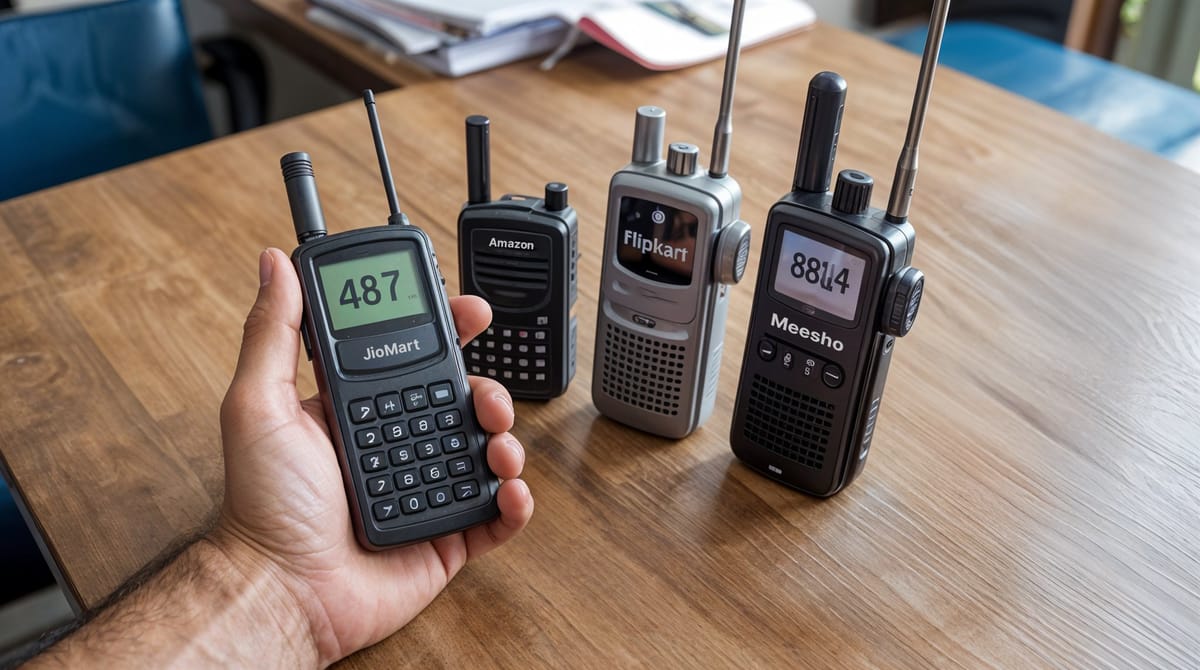The Great Walkie-Talkie Mystery
In the beginning, the holy trinity of online business in India like JioMart, Flipkart, Amazon, and Meesho, the innocent retailers, were giving away walkie-talkies. It is really surprising how they were selling gadgets that could be dependent on the frequencies that they did not even know about.
At a sudden moment, Central Consumer Protection Authority (CCPA) informed the companies of their illegal action, and the numerous unauthorized listings were all deleted by the platforms.
An initial revelation showed that Amazon, Flipkart, Meesho, and TradeIndia have respectively 467, 314, 489, and 423 unauthorized needy sellers.
OLX and IndiaMART are two examples of the 13 platforms that received the notices, each of them was not clear about the licensing information of the items they posted for sale.
License to Chat Properly Effectively
Their grouchiness was not for no reason, the regulators had to comply with the law stakeholders, in the first place:
Walkie-talkies are designed to work on particular frequencies of radio and not to use the incorrect bands that can misbehave the police, emergency services, and even the national security. The history of such attacks (such as the Pahalgam incident) was the main reason for making the regulators very uneasy.
Here media gains the upper hand because there are a number of laws relevant in this case such as the Indian Telegraph Act, 1885, the Wireless Telegraphy Act, 1933, regulation enacted in 2018 among others.
The resolution of the CCPA was expressed as "That's it!" They initiated the setting up of draft guidelines, document which is done in cooperation with DoT and MHA, where one of the requirements is that every item must have the frequency range.
- The modulation method,
- The type of Equipment
- Type Approval (ETA) info
- Whether a wireless operating license is legally required
- Enforcement rules supported by strict penalties for non-compliance
- Platforms Scramble Like a 90s Emergency Drill
The marketplaces had their own flashbacks:
Amazon and Flipkart were quick to take down all the walkie-talkie product listings when the CCPA inquiry was made known, where else, Meesho, Meta (Facebook) and a few others did the same in no time.
To take some other examples (such as Talk Pro and MaskMan Toys), their response was delayed, but with the watchdog now focused on them.
Why Now? Because the Neighbors Got Loud
The fear of phobia for national security was the other facial aspect of the affair:
- The India‑Pakistan border conflict under Operation Sindoor resulted in strained relations; As a result, the unauthorized sale of wireless equipment was seen as beyond the pale of just normality.
- Subsequently, it was Union Minister Pralhad Joshi who, in the strongest terms, stressed that having "non-complaint wireless devices" was a great threat, as they could lead to "national security operations" in danger.
Consumer Confusion Chronicles
And while the government was busy trying to figure out how best to do, the end-users were not able to cope fully:
- People anticipated that by spending just $20 on a toy walkie-talkie, they would have a wonderful communication tool to use more often than not, but also believe that no permission is necessary for such activities. Oops!
- Upon the enforcement, a guardian who bought them for a school project realized that only then is when the devices require a license.
Bullets of Compliance: What Platforms Must Do Now
Platforms that are ethical and responsible and, at the same time, can work and interact with the police need to do the following right now:
- Before listing the items, make sure that the seller's credentials and certifications are verified.
- Be transparent with the frequency band, licenses, and ETA details.
- Take down non-compliant listings by having automated systems in place and carrying out regular audits.
- The CCPA will get all the information provided by the sellers, starting with their names, URLs, and sales numbers from January 2023.
Moral of the Tale: Speak Politely and Legally
The concluding verse of the digital marketplace fable could be summarized by the following:
- A toy is not a walkie-talkie—it is a communication tool that may require a permit.
- Both consumer demand and national security are the issues regulators are serious about.
On one side, marketplaces have become more difficult: they have to make fun gadgets available to the general public without incidentally provoking a frequency war with local authorities.



Member discussion